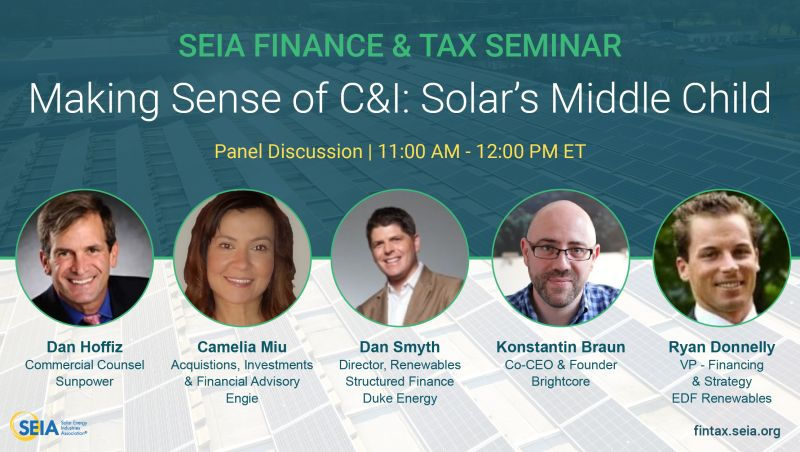- Jun 28, 2021
- 5 min read
Lessons from the Commercial and Institutional Solar Industry
The group discussed ways to ease financing complexity for C&I projects and unlock this market sector. A theme from this panel was discussing common barriers experienced by developers and installers. Panelists shared their experience on the challenges of developing projects nationwide and recommendations on overcoming these barriers to support the C&I market growth. Here are highlights from the speakers:

Importance of Incentives
Solar has experienced generous incentives, especially from the federal level; however, the structure to securing incentives in the C&I has been a critical impediment to the market. In addition, differences in state requirements and incentive framework significantly impact the awarding of the contract and the timeline of the project.
Particularly, the incentive structure is a particular obstacle when financing projects as some states will not allow third-party ownership or net metering. This can reduce revenue streams or make a project unviable.
Role of Legal
Legal involvement and structure are critical for a successful contract, however long negotiations and many party-involvement drives legal expenses, which affects the project's overall cost.
Banks as a Financial Ally
Participation of banks for securitization and financing is crucial and can dramatically help the ease of project development. Businesses in the C&I market can really benefit from support from banks to reach scale.
COVID's Impact on Solar
The solar industry is facing unique challenges due to COVID that all parties need to be aware of and prepare for. Generally, there are many supply chain delays, shortages of raw materials and equipment. This will require more communication and coordination with developers and consumers to set the appropriate goals for successful project completion.
Why Get Involved in the C&I Market?
Despite some of the challenges, the C&I market is very attractive and has many project opportunities. The speakers share three reasons why they are excited to be working in C&I:
-
It is a vast market that is only growing more, providing many unique and diverse opportunities to investors. It is a great time to get involved, and investors can even lose out on great deals. With proper education and upfront investment, C&I projects can have very high yields.
-
Across the market, there are good off-takers, attractive portfolios, and large opportunities to reach scale.
-
The C&I market is more diverse, more prominent, and less competitive than the utility market making it less risky.
Thank you to SEIA for organizing this event and featuring a panel that sheds light on finance tax and investment for the C&I market. It is an exciting time for the market, and there are many great projects and opportunities to look forward to.
Celine Damide is a Clean Energy Data Analyst at Brightcore. She contributes to our sustainability blog, where we share insights on clean energy solutions for your business or institution, whether you have a fully formed corporate social responsibility plan or you are just starting to consider a renewable energy or energy efficiency strategy. Follow Celine and Brightcore Energy on LinkedIn and Twitter (@BCEnergy).


